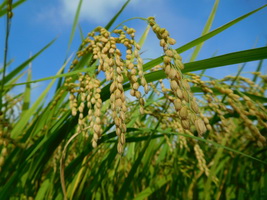
Rice Gene Makes Maize Productive; To Do the Same for Other Crops
February 14, 2018| |
 In field trials three years ago, biotechnologists showed that they could increase maize productivity by introducing a rice gene into the plant that regulated the accumulation of sucrose in kernels, which also led to more kernels per maize plant. This promising technique is set to do the same for other crops, including wheat and rice.
In field trials three years ago, biotechnologists showed that they could increase maize productivity by introducing a rice gene into the plant that regulated the accumulation of sucrose in kernels, which also led to more kernels per maize plant. This promising technique is set to do the same for other crops, including wheat and rice.
The rice gene affected the performance of a natural chemical in maize, trehalose 6-phosphate (T6P), which influences sucrose distribution in the plant. But they were keen to discover more intimate details of the relationships governing the increased productivity.
The transgenic maize depressed levels of T6P in the phloem, a major component of the plant's transportation network. This allows more sucrose to move to developing kernels and, serendipitously, increasing rates of photosynthesis, thereby producing even more sucrose for more kernels. The team also looked at the phloem within the plant's reproductive structures which are sensitive to drought. Female kernels abort, but keeping sucrose flowing within the structures prevents this abortion.
More details are available at Rothamsted Research News.
| |
Biotech Updates is a weekly newsletter of ISAAA, a not-for-profit organization. It is distributed for free to over 22,000 subscribers worldwide to inform them about the key developments in biosciences, especially in biotechnology. Your support will help us in our mission to feed the world with knowledge. You can help by donating as little as $10.
-
See more articles:
-
News from Around the World
- Nigeria is Gearing towards Commercializing GM Seeds
- Genetic Trigger Adds Branches to Plants, Could Boost Crop Yields
- Australian OGTR Approves GM Cotton (COT102) and Canola (DHA Canola)
- USDA FAS-GAIN Reports Advancement of Agri-biotech in Bangladesh
- Found: Gene that Confers Resistance to Septoria
- Temperature Resilient Crops Now an "Achievable Dream"
- German Study Analyzes Risk Perceptions of Consumers Regarding GM Crops
- Rice Gene Makes Maize Productive; To Do the Same for Other Crops
-
Research Highlights
- Scientists Conclude Safety of Pseudomonas as Source of Genes for GM Crops
- RTD1 Involved in Tocopherol Biosynthesis and Plant Development in Rice
-
Beyond Crop Biotech
- Pheromone from Asian Citrus Psyllid that Transmits Citrus Greening Now Identified
- Scientists Sequence Genomes of 60 Citrus Varieties to Draw Up Family Tree and Understand Disease Response
- TcCHS Gene Confers Strong Resistance Against Cotton Aphids
-
Resources
- Science and She Campaign
-
Plant
- Researchers Test CRISPR-Cas9 on Red Sage
- OsPKS2 Controls Rice Male Fertility by Regulating Pollen Wall Formation
- TALENs-mediated Editing in Potato via Agroinfiltration
- Scientists Study the Function of OsPT4 in Arsenic Uptake in Rice
-
Read the latest: - Biotech Updates (January 21, 2026)
- Gene Editing Supplement (January 28, 2026)
- Gene Drive Supplement (February 22, 2023)
-
Subscribe to BU: - Share
- Tweet
